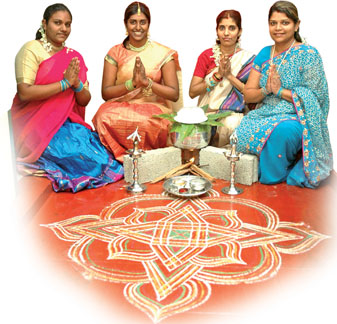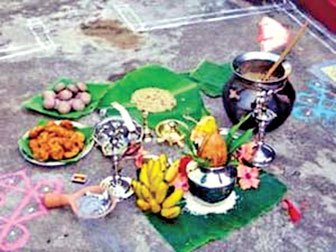|
Thai Pongal:
Festival of harvest
By Thulasi MUTTULINGAM
Thai Pongal, the festival of the Tamils falls on January 15 this
year. It is perhaps known primarily as a Hindu festival of harvest.
The concept of the celebration is known to various farming
communities across diverse regions and cultures; the concept of
thanksgiving.
 In
today's automated world where we can buy non seasonal and non regional
fruits and vegetables over the counter, many of us might not know what
it must be like to be dependant on cultivation within a community, to
survive as a community. In
today's automated world where we can buy non seasonal and non regional
fruits and vegetables over the counter, many of us might not know what
it must be like to be dependant on cultivation within a community, to
survive as a community.
The first thing that our ancestors did when they stopped being hunter
gatherers /nomads and settled down, was cultivation. If the weather or
some other disaster like plant disease struck, the crops would be ruined
and there would be no produce to be had. Rich and poor alike would have
to starve.
Man's bond with nature was intense at this time and he deified the
Sun, deified rain and water, deified even the farm animals and
constantly prayed to nature that no calamity should befall the crops.
After a year or months of toil when the crops are finally harvested, the
extreme relief and jubilation of the community gives rise to
celebrations, which taking place regularly over time, assume the mantle
of a festival.
Thai Pongal is also known as Ulavar Thirunaal (the Day of the
farmers) in Tamil and while it is of particular importance to the
farmers, the entire community of Tamils celebrate the occasion, stemming
back from times when the entire community depended on that farming
produce. An ancient festival of Thanksgiving to God, the Sun, Rain, and
the farm animals (cattle) once the first paddy was harvested, it is
still celebrated by most Tamils, wherever they might be in the world.
Some living in condominiums in other countries might use gas cookers and
pressure cookers but they remain true to the spirit of the tradition.
Meanwhile in Sri Lanka, where also many use gas cookers these days,
people as much as possible remain true to the tradition of their
ancestors by making the pongal in a clay pot placed over a makeshift
hearth, made with three bricks and lighted with firewood.
|

Religious blessings |
The festival falls on the first day of the month of Thai, a new
beginning for the Tamils. Rice, their staple food for consumption has
just been harvested and they can relax and enjoy themselves awhile
before entering another year of sowing and reaping. In recognition of
this new beginning, the day before Thai Pongal, the last day of the
month of Margali is set aside for cleaning up and the removal of dross
all round. Houses and gardens are cleaned / spruced up, all old and
unnecessary items are collected and a huge bonfire is made in the
evening to dispose of them. People are told to symbolically offer all
their old resentments and anger into the fire to burn away their inner
rubbish as well as their physical rubbish. A new time is beginning and
people are expected to go into it light hearted and free. This day is
also dedicated to the God of Rain, Indra, whose timely help is much
needed for the harvest and whose wrath and deluge is sought at all times
to be avoided. The next day is the primary festival, Thai Pongal,
especially dedicated to the Sun God Surya. People wake up before dawn,
bathe and wear new clothes (to symbolize a new beginning) and come out
of their houses to make the pongal. Rectangular kolams (designs made
with rice flour) are drawn on the ground and a new clay pot is placed on
a freshly made brick hearth, facing the East. The pongal should ideally
be boiling by the time the Sun rises in the sky; an offering to the Sun
in recognition of its necessity to farmers.
Pongal refers to the sweet dish made on this day, with the freshly
harvested paddy but it gets its name from the fact it is allowed to boil
over. A pot spilling over with its contents is considered a sign of
abundance and prosperity and so, first the milk heating in the pot and
then the rice dish made in it, is allowed to boil over (pongal means
boiling over).
In the pre dawn morning air, families congregate together to make the
pongal and pray together in thanksgiving and hope for yet another
bountiful year. Cow's milk is poured into the pot to heat and once it
boils over, the head of the family, ceremonially and prayerfully pours
in the rice grains from his cupped palms. The rest of the family follows
suit until the required amount of rice has been put in and then the dish
is sweetened with sugarcane juice, jaggery, raisins and cashew nuts.
When it is ready, it is heaped onto a freshly cut banana leaf (stemming
from a time when people used banana leaves as plates) along with fruits
and other savouries and offered to the Sun. it is then offered as Prasad
or consecrated food to members of the family, friends and neighbours.
|

A feast of sweetmeats |
While the main festival of Thai Pongal is celebrated everywhere by
Tamils, the farming community and elements of the South Indian Tamils as
well as Hill Country Tamils in Sri Lanka, generally celebrate it over
four days.
The first day, when the bonfire is made and Indra the God of Rain
propitiated, is known as Bhogi Pongal. The second day is Thai Pongal.
The third day is known as Maatu Pongal. Maatu means cattle, a very
necessary and useful animal to farmers. From the production of milk and
manure, to the ploughing or fields and drawing carts to take the produce
to the market, cattle are of vital importance to the farmer and their
services are recognized on this day. They are bathed, garlanded and
ornamented with trinkets. They are even worshipped and generally
extensively pampered and petted. The pongal made on this day is
dedicated solely to them and they get the first offerings as well as
fruits and sugar cane.
The last and fourth day is Kaanum Pongal, Kaanum means to see and
this is a day dedicated to visiting friends, relatives and neighbours, a
period of cementing new friendships as well as old.
This year has proved an especially bountiful year for the Northern
farmer. Over the past year, there has been a significant increase in the
production of paddy from the Northern Province, which has just been
harvested and two new paddy storage units are to be opened to
accommodate them. For years, acres of land which were once planted with
bountiful crops were planted with landmines. Instead of yielding
prosperity and new life they brought about widespread grief and loss of
life. Now at last, large tracts of land have been cleared up for
cultivation once more. From 91,396 acres in 2009, the area of
cultivation in the Northern Province rose to 221,818 acres in 2010. A
bumper harvest of 60 percent has been recorded.
Every year, Tamils usher in the Thai Pongal as the dawn of new
beginnings. This year, it will be especially true. |

